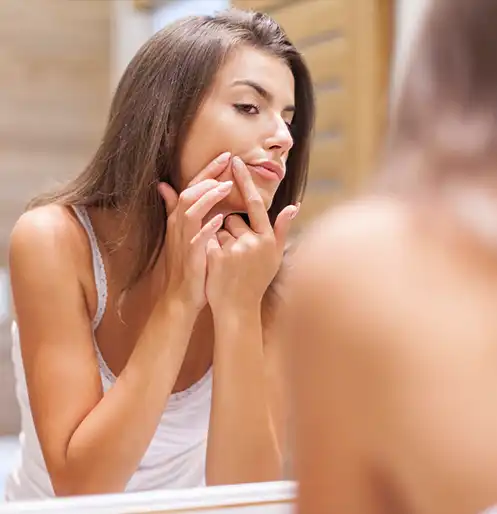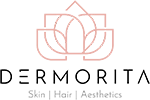Acne Treatment in Delhi
Let your acne go away! Get clear, healthy skin with DermoRita
Acne can come to anyone at any age. It is one of those skin concerns that can be frustrating, painful, and impactful to self-confidence, all at the same time.
If your acne breakouts are stubborn and affect your confidence and daily life, you have reached the right place. DermoRita is a way to get rid of acne breakouts. At our clinic, we offer high-quality acne treatment in Delhi. We design our treatment according to the patient’s skin concerns and requirements. We target acne at its root cause to provide long-lasting and visible results.
So, don’t worry and wait anymore. Our expert dermatologists are here to remove all your worries about acne from your skin. Our clinic loves helping people regain smooth, healthy, and radiant skin.
Book your free consultation today!
Who Are the Ideal Candidates for Acne Treatment?
There is no doubt that acne is a general concern most people face. However, some acne comes and goes in 2-3 days. You may not require treatment to remove those, but you are an ideal candidate for acne treatment if you are struggling with any of the following acne-related concerns:
- You have persistent acne. They are not responding to over-the-counter treatments.
- You have severe breakouts like cystic and nodular acne.
- You have acne scars and pigmentation from your previous breakouts.
- You have oily skin that leads to acne breakouts frequently.
- You have acne due to hormonal imbalances like puberty, pregnancy, or PCOS.
- You have acne caused by external factors such as pollution, diet, or stress.
- You are looking to have clear, smooth, and even skin.
If you face any skin concerns mentioned above, consult expert dermatologists at DermoRita. We help you assess your skin condition and recommend a suitable treatment plan tailored to your needs.
Benefits of Acne Treatment
When you opt for acne treatment, its benefits don’t stick to reducing acne or scars from your skin; it goes beyond that. Here is what acne treatments can offer you:
- It helps you reduce inflammation. Moreover, it prevents your skin from further breakouts by calming red and swollen acne areas.
- It helps minimize the risk of deep acne scarring and hyperpigmentation.
- If your skin produces extra oil, it helps you control excess sebum, reducing acne flare-ups.
- It helps you remove dirt, bacteria, and dead skin cells from your skin by deep cleansing.
- You shine when you feel confident. It helps you boost your confidence by giving you clear, glowing skin.
- Advanced acne treatments are personalized. They are designed according to your skin type and severity.
- This is not a temporary fix. The treatments help you have acne-free skin for the long term.
Procedure of Acne Treatment
Dermatologists at DermoRita don’t apply one single procedure to all patients. Instead, we follow a scientific, step-by-step approach to treating acne. We customize each acne treatment based on the severity and type of acne. Following is the list of procedures that are used to treat acne:
Topical & Oral Medications
Topicals and medications work for mild acne problems. Experts prescribe creams, gels, and antibiotics to reduce bacterial growth and inflammation. Retinoids are provided to unclog pores and promote faster skin cell turnover.
Chemical Peels
Experts apply mild to moderate peels to exfoliate and remove dead skin cells. This procedure is helpful to people who want to improve skin texture, reduce acne scars, and control oil production.
Laser & Light Therapies
Laser and light therapies are used for a variety of reasons:
- To kill acne-causing bacteria and reduce inflammation.
- To target active acne lesions.
- For deep acne scars and skin resurfacing.
Microdermabrasion & HydraFacial
This acne treatment procedure exfoliates the top layer of skin, removes impurities, and improves overall skin tone. Moreover, it hydrates and nourishes the skin to restore a healthy glow.
Comedone Extraction
This procedure extracts the blackheads and whiteheads to prevent further breakouts.
At DermoRita, we customize each treatment based on your skin type and acne severity. This helps us offer the most effective results.
Average Cost of Acne Treatment in Delhi
The average acne treatment cost in Delhi ranges between INR 3,500 to INR 15,000. Moreover, the actual cost of the treatment depends on many other factors, including:
- The type of acne treatment. For example, laser, chemical peels, etc.
- The severity of your acne breakouts will decide the number of sessions required. You may need to pay more for more sessions.
- The reputation of the clinic.
- The experience and expertise of the dermatologist.
- If you are clubbing any other skincare procedures with acne treatment.
How Much Does Acne Treatment Cost in Delhi?
Here is the breakdown of the different acne treatment costs in Delhi.
|
Procedure |
Price Per Session |
|
Chemical Peels |
₹3,000 - ₹6,000 per session |
|
Laser Treatment |
₹6,000 - ₹15,000 per session |
|
Blue Light Therapy |
₹4,000 - ₹8,000 per session |
|
Oral & Topical Medications |
₹1,500 - ₹5,000 per consultation |
|
HydraFacial for Acne |
₹3,500 - ₹7,500 per session |

Why Choose DermoRita for Acne Treatment in Delhi?
With so many clinics in Delhi, finding the right clinic is the only way to get clear, healthy, glowing skin. Here is how DermoRita is a way to go:
Experienced Dermatologists
Owned by Dr. Sarita Sanke, an expert dermatologist with a decade of experience, DermoRita is the leading clinic in Delhi. Her team is comprised of highly skilled and certified skin specialists with years of experience helping people have glowing and healthy skin.
Customized Treatment Plans
Our clinic ensures personalized treatment solutions are designed based on your skin type, acne severity, and lifestyle.
Advanced Technology & Techniques
DermoRita uses the latest technologies and is FDA-approved for skin treatment.
Safe & Effective Procedures
We offer non-invasive, safe, and clinically proven treatments to reduce acne without harsh side effects.
Affordable Pricing
We are affordable. Our clinic offers competitive pricing and different budget-friendly packages for acne treatment.
State-of-the-Art Clinic
We are a modern, well-equipped dermatology clinic in Delhi.
Comprehensive Aftercare Guidance
We ensure to offer the best aftercare guidance so that you get long-lasting acne-free results.
Take the first step towards acne-free skin. Contact Dr. Sarita Sanke today!

